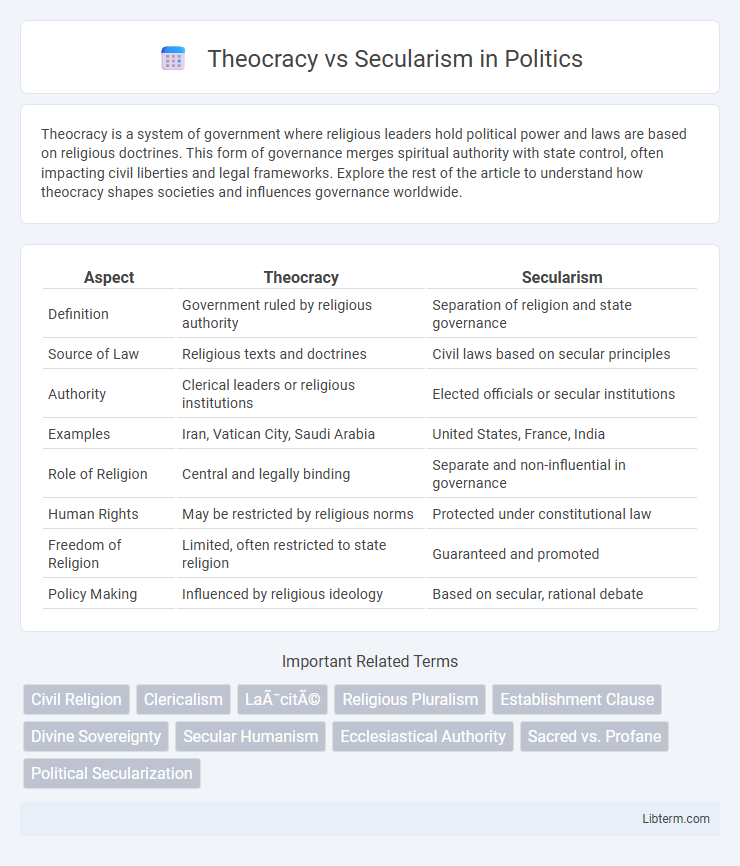Theocracy is a system of government where religious leaders hold political power and laws are based on religious doctrines. This form of governance merges spiritual authority with state control, often impacting civil liberties and legal frameworks. Explore the rest of the article to understand how theocracy shapes societies and influences governance worldwide.
Table of Comparison
| Aspect | Theocracy | Secularism |
|---|---|---|
| Definition | Government ruled by religious authority | Separation of religion and state governance |
| Source of Law | Religious texts and doctrines | Civil laws based on secular principles |
| Authority | Clerical leaders or religious institutions | Elected officials or secular institutions |
| Examples | Iran, Vatican City, Saudi Arabia | United States, France, India |
| Role of Religion | Central and legally binding | Separate and non-influential in governance |
| Human Rights | May be restricted by religious norms | Protected under constitutional law |
| Freedom of Religion | Limited, often restricted to state religion | Guaranteed and promoted |
| Policy Making | Influenced by religious ideology | Based on secular, rational debate |
Understanding Theocracy: Definition and Key Features
Theocracy is a system of government where religious leaders control political power, and laws are based primarily on religious doctrines. Key features include the fusion of church and state, theocratic leadership often claimed as divinely guided, and governance driven by sacred texts or religious authorities. Understanding theocracy requires recognizing its impact on legal frameworks, societal norms, and individual freedoms within such regimes.
What is Secularism? Core Principles Explained
Secularism is the principle of separating religion from government institutions and ensuring that public policies are free from religious influence. It emphasizes equal treatment of all citizens regardless of their faith, promoting religious neutrality in legal and political frameworks. Core principles include freedom of religion, non-establishment of a state religion, and protection of individual rights in a pluralistic society.
Historical Origins of Theocracy and Secularism
Theocracy originated in ancient civilizations such as Mesopotamia and Egypt, where rulers were often seen as divine or directly guided by deities, establishing governance intertwined with religious authority. Secularism emerged notably during the European Enlightenment in the 17th and 18th centuries, advocating for the separation of church and state to promote individual freedoms and rational governance. The historical origins of both systems reflect contrasting approaches to power: divine legitimacy in theocracy versus human-centered political authority in secularism.
Governance Structures: Theocratic vs. Secular States
Theocratic states base governance on religious doctrines, where political authority is often vested in religious leaders or institutions, enforcing laws aligned with sacred texts. Secular states separate religion from government, establishing legal and political systems independent of religious influence to ensure neutrality and equal rights for all citizens. This distinction shapes policy-making, civil liberties, and the role of religion in public life, influencing societal norms and governmental legitimacy.
Religion and Law: Integration vs. Separation
Theocracy merges religion and law, where religious doctrines directly shape legal systems and governance, often leading to laws based on sacred texts or clerical authority. In contrast, secularism advocates for the separation of religion and state, ensuring that laws are created through rational, inclusive, and non-religious frameworks to uphold pluralism and protect individual freedoms. This fundamental difference impacts legal interpretations, civil rights, and the role of religious institutions in public policy and societal norms.
Social Impacts: Freedom, Rights, and Tolerance
Theocracy often limits freedom and restricts individual rights by enforcing religious doctrines as state law, resulting in reduced tolerance for diverse beliefs and lifestyles. Secularism promotes separation of religion and state, enhancing personal freedoms, protecting human rights, and fostering a pluralistic society with greater acceptance of different viewpoints. Social tolerance under secular governance encourages coexistence and equal rights regardless of religious affiliation, gender, or ethnicity.
Education Systems Under Theocracy and Secularism
Education systems under theocracy prioritize religious doctrines, integrating sacred texts and clerical teachings as core curriculum components, often limiting exposure to secular scientific theories to maintain religious orthodoxy. Secular education systems emphasize a diverse, evidence-based curriculum that promotes critical thinking, scientific inquiry, and inclusivity regardless of religious beliefs, ensuring equal access to knowledge for all students. The contrast significantly impacts academic freedom, curriculum breadth, and the development of independent reasoning skills among learners.
Case Studies: Examples Around the World
Iran represents a prominent example of theocracy, where religious leaders wield political power, shaping laws based on Islamic principles. In contrast, France exemplifies secularism through its strict separation of church and state, ensuring that religion does not influence government policies. India showcases a unique blend, maintaining secular governance while accommodating diverse religious communities within its constitutional framework.
Advantages and Disadvantages of Both Systems
Theocracy offers the advantage of unified governance based on shared religious values, potentially fostering social cohesion and moral clarity, but it risks suppressing religious minorities and stifling individual freedoms. Secularism promotes equal treatment of all religions and protects freedom of belief, encouraging pluralism and innovation; however, it may lead to moral relativism and societal fragmentation in deeply religious communities. Both systems face challenges balancing authority and individual rights, impacting social stability and personal liberties depending on cultural and historical contexts.
The Future of Governance: Trends and Challenges
The future of governance faces significant challenges as theocratic and secular systems adapt to global demands for inclusivity, human rights, and digital transparency. Theocratic regimes often struggle with modernization pressures while secular states navigate the balance between religious freedoms and state neutrality. Emerging trends indicate increased hybrid models where governance incorporates religious values within secular frameworks to address societal complexity.
Theocracy Infographic

 libterm.com
libterm.com